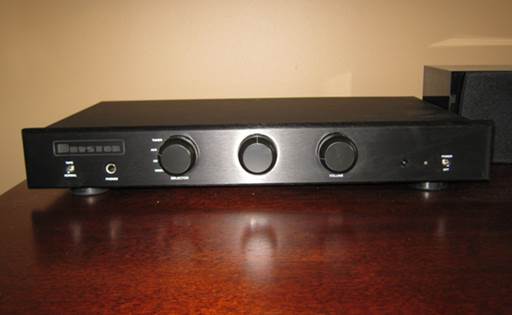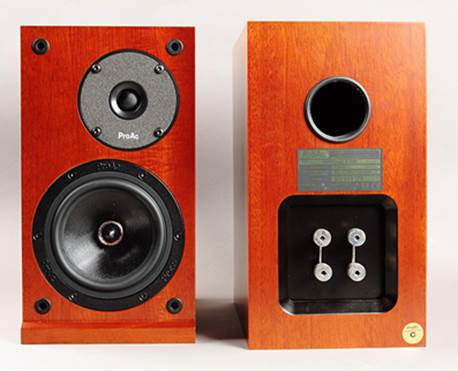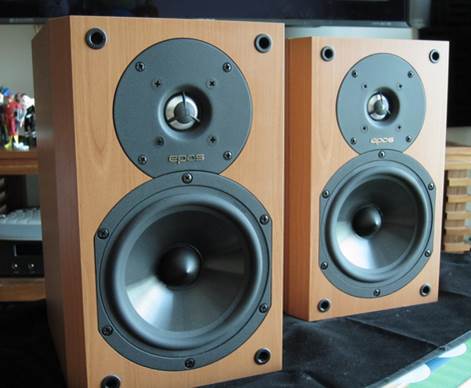Performance
I strapped the pair of Aura 1 speakers into
my kit - a Bryston BP6 preamplifier, 4B-SST2 amplifier (might sound like
overkill but we’ll see) and Logitech Squeezebox Touch (a sleeper of a product
if there ever was one but sadly now discontinued). Using the Kimber Kable
interconnects and speaker cables that were provided by Kimbercan, I broke in
the Aura 1 loudspeakers. SA recommends giving these speakers between 50 to 100
hours of break-in, which is what they got and then some. I can say that when I
first plugged them in, what I heard was vague and sedate but those first
impressions were soon to change break-in brought on a metamorphosis, a new
creature emerged.

a
Bryston BP6 preamplifier
SA designed the Aura 1 to be used in a
multitude of applications, including on a shelf, within a bookcase, on wall or
ceiling, as well as more traditionally on speaker stands; magnetic shielding
provides even greater flexibility. I began with some placement trials. First, I
tried sitting them on a low shelf, then with actual books to their sides akin
to a bookshelf and eventually I moved them to stands. On the shelf, their bass
was strong - striking, in fact. However, though the bass was robust, giving the
little Aura 1 a large-and-in-charge demeanor it wasn’t quite linear, with some
bloating in the 60 Hz region; however, I could see how many might find this
bass heft appealing. Putting books to their sides didn’t seem to impact their
tone but it compromised center focus and imaging. All said, the Aura 1 was
definitely usable in either placement but ultimately, it was on stands that they
found their best voice. Sitting on stands they sounded tighter, more accurate
and had the best imaging. Stand placement was also a factor. With the stands
three feet away from the back wall, the Aura 1 was wanting in bass, moving them
to within a foot of the walls and like a waking giant the Aura 1 acquired a
much stronger and dynamic presentation and so that is how they sat for my
ensuing listening sessions.

One
album that’s been getting a fair bit of play in my home is Melody Gardot’s
latest, “The Absence”
One album that’s been getting a fair bit of
play in my home is Melody Gardot’s latest, “The Absence”. The album is
thoughtfully named, as it comes after her hiatus from the recording scene. If
you haven’t been exposed to Melody Gardot’s wonderful voice and recordings I’d
say you’re missing out - go get acquainted. With the track, Lisboa,
church-bells rang in the distance and the sounds of outdoors served to
captivate me. Bells ringing from left to right carried not only a natural
metallic brightness but also a fullness of tone. Melody’s voice came in warm,
inviting and noticeably smooth. This warmth in the midrange was enticing and
quite surprising given the small stature of the Aura 1. A shaker was delivered
with a raspy character, while bringing forth the echo of the surrounding
recording venue and embodying a three-dimensional quality. I found the cymbals
clear with their trailing sustain present but somewhat subdued and brief. The
stand-up bass sounded surprisingly full - not quite like a full-size tower
loudspeaker but enough to have you thinking you were listening to considerably
larger speakers. Bass string plucks had an enjoyable tension and guitar too was
delivered with a wonderful tonal quality, body and detail.
It was here, that I swapped in my Epos ELS3
bookshelf speakers for comparison. Though the Epos is larger in size with a
bigger 5 inch woofer, it weighs no more than the Aura 1 and was unable to match
the Aura 1 in bass weight and extension. The Epos though brought its own
strengths to this aural table - delivering more distinct leading edges on notes
and revealing more of the ambient sounds on this recording, such as the rustle
and air of the outdoors. Cymbals with the Epos also had a more apparent shimmer
and greater sustain. The soundstage with the Epos was more open and airy,
adding to its size. However, vocals were more etched with sibilance more
evident. I moved next to the track Amalia, which is a playful tune that
balances an uplifting rhythm with the melancholy. Here the Aura 1 successfully
imparted the varying emotions that Melody’s voice and the arrangements were intended
to evoke. There was a very nice weight to the opening bass pluck, a lucid
portrayal that had me riveted. Melody’s voice, once again, sounding beautiful,
liquid and smooth - her vocal inflections coming across in a natural manner.
The guitar plucks had a nice snap and were accompanied by a healthy share of
woody resonance. On the back-up chorals, the voices were set a little behind
Melody and stretched from left to right, just pushing outside the room
boundaries. The bird chirps at the end of the track left me wanting for more.
With the track, So We Meet Again, the Aura 1 effectively demonstrated its
ability to layer elements in the soundstage - bass centered and to the back
with violins spread across the rear and guitar up front center and to the
right. Cymbals on this track were soft and feathery, though just a tad short on
sustain.

Epos
ELS3
I moved to the Cowboy Junkies, The Trinity
Session album. First up was Sweet Jane. The high-hat was clearly to the right
and the most forward element. Margot’s voice was velvety and delivered in her
whispering style with enticing smoothness and inviting clarity. The echo of the
venue was apparent but a little contained, which brought a little more intimacy
and warmth to the tune. Cymbals here were clear in their intrinsic metallic
quality but somewhat subdued in their shimmer. Bass and guitar, from the rear
was clear and distinct. On Misguided Angel, the airiness of the church venue
was exposed. Here the Aura 1 did not disappoint in conveying the faintly
whispered count, which ushers in this track.. .”2, 3”. Instruments were defined
in their spaces and the micro dynamics of the strings were noticeable. Bass
here again had impressive weight and respectable extension. Some of the deepest
Sonics on this album were absent but it did not detract from the musical
enjoyment the Aura 1 was able to provide.
I decided to give the Aura 1 a little
different workout - moving to the Tron soundtrack from 2010. This soundtrack is
an interesting mix of a full orchestra with Daft Punk’s take on electronica.
The album tests grandeur, delicacy, details and dynamics. On the tracks,
Recognizer, Armory and Rinzler, the Aura 1 served up surprising bass weight,
extension and dynamics. The soundstage was respectable in size and had good
definition. I did find that some of the airiness and uppermost frequency
presence were reserved. Here again I compared the Aura 1 with my Epos ELS3
speakers. The Epos was better able to bring to light the immensity of the
venue, adding a greater airiness and delicacy to the track. That said, the
authority which the Aura 1 delivered on this track and the overall ease was not
to be matched.
The Aura 1 is a wolf in sheep’s clothing.
It truly surprised me in terms of the sheer size and body of the sound that it
was able to command. Unlike bookshelf speakers of its size or some considerably
larger, the SA Aura 1 can deliver midrange weight and bloom that leaves little
to be desired. Its lower midrange and upper bass reproduction is quite
astounding given its modest dimensions. Voices come across with a humanness and
warmth that is very inviting. In the treble, the Aura 1 has a slightly dark
quality, which ensures that it never sounds dry, etched or rough. This can be a
wonderful thing when it comes to the many substandard recordings that are out
there and also lends itself very nicely to rock, alternative and the like. High
frequencies are more silky than incisive, which can be very pleasant. With a
list price of $799 / pair, the Aura 1 is speaker to take note of. System Audio
has managed to produce something in the Aura 1 that embodies contemporary
design, big sound and musical beauty. The company’s philosophy has obviously
served it well.